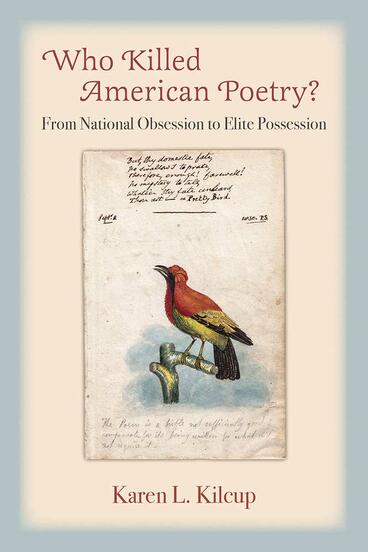Who Killed American Poetry?
From National Obsession to Elite Possession
19th-century American magazine reviewers helped establish—and subsequently destroy—poetry’s place as a powerful national literature
Description
Throughout the 19th century, American poetry was a profoundly populist literary form. It circulated in New England magazines and Southern newspapers; it was read aloud in taverns, homes, and schools across the country. Antebellum reviewers envisioned poetry as the touchstone democratic genre, and their Civil War–era counterparts celebrated its motivating power, singing poems on battlefields. Following the war, however, as criticism grew more professionalized and American literature emerged as an academic subject, reviewers increasingly elevated difficult, dispassionate writing and elite readers over their supposedly common counterparts, thereby separating “authentic” poetry for intellectuals from “popular” poetry for everyone else.\
Conceptually and methodologically unique among studies of 19th-century American poetry, Who Killed American Poetry? not only charts changing attitudes toward American poetry, but also applies these ideas to the work of representative individual poets. Closely analyzing hundreds of reviews and critical essays, Karen L. Kilcup tracks the century’s developing aesthetic standards and highlights the different criteria reviewers used to assess poetry based on poets’ class, gender, ethnicity, and location. She shows that, as early as the 1820s, critics began to marginalize some kinds of emotional American poetry, a shift many scholars have attributed primarily to the late-century emergence of affectively restrained modernist ideals. Mapping this literary critical history enables us to more readily apprehend poetry’s status in American culture—both in the past and present—and encourages us to scrutinize the standards of academic criticism that underwrite contemporary aesthetics and continue to constrain poetry’s appeal.
Who American Killed Poetry? enlarges our understanding of American culture over the past two hundred years and will interest scholars in literary studies, historical poetics, American studies, gender studies, canon criticism, genre studies, the history of criticism, and affect studies. It will also appeal to poetry readers and those who enjoy reading about American cultural history.
Karen L. Kilcup is Elizabeth Rosenthal Professor of English, Environmentalism & Sustainability Studies, and Women’s & Gender Studies at UNC Greensboro.
Reviews
"In its historical sweep, Kilcup’s original and important book reveals just how catastrophic 'gender-based standards' can be when they 'demean emotional responses to literature.' ... Essential."
- J. N. Barron, The University of Southern Mississippi
-- CHOICE
"Kilcup has marshaled an impressive amount of evidence in making her case. More generally, those who wish to learn about the formation and transformation of taste in nineteenth-century United States or in the work of many forgotten figures whose work nevertheless remains of interest, both esthetically and historically, will find Who Killed American Poetry? a lively, informative, and provocative work of scholarship."
- Women's Studies
—Women's Studies

